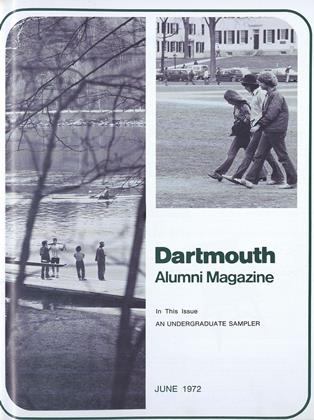. By Peter J.French '64. London: Routledge & KeganPaul, 1972. 243 pp. With 16 plates.$12.50.
John Dee (1527-1608) was a magus, a scholar of immense and abstruse learning which gave him, some believed, dangerous supernatural powers. Mr. French's study of Dee is therefore timely, not, however, because of recent enthusiasm for the occultism of Rosemary's Baby or astrological mumbo-jumbo, but because it reveals the origins of these difficult questions: How should knowledge be used? What are the purposes of technology? What are the limits of technological aspiration?
Because of his knowledge of mathematics, a then relatively little-known science, Dee was one of the most respected and feared men of his time, and he was also one of the most mysterious and übiquitous. Monarchs, politicians, philosophers, poets, astronomers, explorers, geographers and cartographers, historians, and bibliophiles from all over Europe consulted Dee on matters of mutual interest. Because he had the largest library in England, larger than either university collection, men came to his home at Mortlake to read his books or to study chemistry and mathematics. He wrote valuable treatises on practical mathematics and made enduring contributions to the technologies of architecture, navigation, and hydrography.
Yet John Dee also spoke with angels. Through the medium of a skryer (a crystal gazer or seer), with the aid of a magic stone, mystical hieroglyphs, and a specially designed table decorated with occult symbols, Dee engaged in heavenly dialogues which he duly recorded and which now repose in the British Museum.
For us, conversing with angels and studying mathematics are divergent activities. Yet for Dee and his fellow Hermeticists, the two were logically related. Mathematics could lead men to the higher reaches of the cosmos, that is, to the very ears of the angels, and it could also give man the power to create peace and plenty, and to quell the religious wars that were boiling up all over Europe. Dee's purpose in studying numbers and their occult powers was simply to better the estate of man. For his pains he lived to see his invaluable library sacked and burned by the Yahoos, his image parodied on the stage, and his old age dimmed by poverty and neglect.
This short notice cannot do justice to the complexity of Dee's philosophy or to the range of his contributions to intellectual history. Neither is it possible to remark in detail on the excellence of Mr. French's book. He has drawn on a wide variety of manuscript sources, and knows thoroughly the recent scholarship in the field, particularly that of Frances Yates and D. P. Walker. The book is valuable in many ways, but especially as it illuminates a crucial stage in the development of technological and scientific thought.
Dartmouth Associate Professor of English,Mr. Epperson gives a course in The EnglishRenaissance, conducts a seminar on Shakespeare, and serves on the Faculty Committeeon Organization and Policy.
 View Full Issue
View Full Issue
More From This Issue
-
 Feature
FeatureThe Future of Liberal Arts Education at Dartmouth
June 1972 -
 Feature
FeatureDartmouth Men and the World: Three Views
June 1972 By ALBERT H. CANTRIL '62 I, THOMAS F. BOUDREAU '62 -
 Feature
FeatureRETIRING FACULTY
June 1972 -
 Feature
FeatureWhitman at Dartmouth—100 Years Ago
June 1972 -
 Feature
FeatureUNDERGRADUATE SAMPLER
June 1972 -
 Article
ArticleThe Myth of the Munich Analogy
June 1972 By STEPHEN C. THEOHARIS '71
Books
-
 Books
BooksAlumni Articles
MAY 1966 -
 Books
BooksPHILOSTRATUS IMAGINES. CALLISTRATUS DESCRIPTIONSES
JUNE 1932 By Chas. D. Adams -
 Books
BooksTHE WRECKING OPERATION: PHASE ONE.
JANUARY 1973 By COLIN D. CAMPBELL -
 Books
BooksWill of the People
June 1980 By David L. Sills ’42 -
 Books
BooksLINDSAY’S PROMISE. THE DREAM THAT FAILED. A PERSONAL ACCOUNT.
OCTOBER 1970 By H. Wentworth Eldredge ’31 -
 Books
BooksTHE ELECTRIC INTERURBAN RAILWAYS IN AMERICA.
June 1960 By WAYNE G. BROEHL JR.

